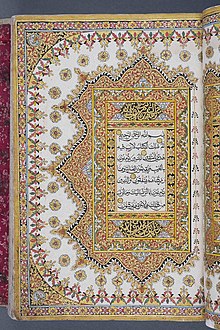Our website is made possible by displaying online advertisements to our visitors.
Please consider supporting us by disabling your ad blocker.
Al-Baqara
| الْبَقَرَة Al Baqarah The Cow | |
|---|---|
| Classification | Medinan |
| Position | Juzʼ 1–3 |
| Hizb no. | 1,2,3,4 and 5 |
| No. of verses | 286 |
| No. of Rukus | 40 |
| No. of words | 6121 |
| No. of letters | 25613 |
| Quran |
|---|


Al-Baqarah (Arabic: الْبَقَرَة, ’al-baqarah; lit. "The Heifer" or "The Cow"), also spelled as Al-Baqara, is the second and longest chapter (surah) of the Quran.[1] It consists of 286 verses (āyāt) which begin with the "muqatta'at" letters alif (ا), lām (ل), and mīm (م).[2][3] The Verse of Loan, the longest single verse in the Quran, is in this chapter.
The sūrah encompasses a variety of topics and contains several commands for Muslims such as enjoining fasting on the believer during the month of Ramadan;[4] forbidding interest or usury (riba); and several famous verses such as The Throne Verse, Al-Baqara 256, and the final two or three verses. The sūrah addresses a wide variety of topics, including substantial amounts of law, and retells stories of Adam, Ibrahim (Abraham) and Mūsa (Moses). A major theme is guidance: urging the pagans (Al-Mushrikeen) and the Jews of Medina to embrace Islam, and warning them and the hypocrites (Munafiqun) of the fate God had visited in the past on those who failed to heed his call.[5]
Al-Baqara is believed by Muslims to have been revealed in a span of 10 years starting from 622 in Medina after the Hijrah, with the exception of the riba verses which Muslims believe were revealed during the Farewell Pilgrimage, the last Hajj of Muhammad.[6][7] In particular, verse 281 in this chapter is believed to be the last verse of the Quran to be revealed, on the 10th day of Dhu al-Hijja 10 A.H., when Muhammad was in the course of performing his last Hajj, 80 or 90 days before he died.[8]
- ^ Salwa M. S. El - Awa, Introduction to Textual Relations in Qur'an, pg. 1. Part of the Routledge Studies in the Qur'an series. London: Routledge, 2005. ISBN 9781134227471
- ^ Quran 2:1
- ^ Sale, George (1891). The Koran: Commonly Called the Alkoran of Mohammed ... New York: John B. Alden.
- ^ Michael Binyon, Fighting is 'allowed' during the holy month of fasting The Times, 18 December 1998
- ^ Sadr-'ameli Sayyid Abbas. "Surah Al-Baqarah, Chapter 2, Introduction". Al-islam. Retrieved 14 May 2015.
- ^ Mahmoud Ayoub, The Qurʾan and its interpreters, pg. 55. Albany: State University of New York Press, 1984. ISBN 9780791495469
- ^ Maariful Quran
- ^ Qurtubi
Previous Page Next Page



